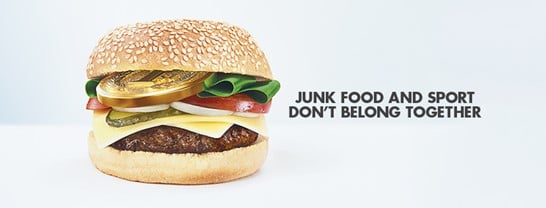
WA’s peak public health and medical experts have united in their call to end the sponsorship of sport by junk food companies, with one of the largest junk food companies in the world granted official sponsorship of the 2021 Tokyo Olympics in Japan.
Cancer Council WA’s CEO, Ashley Reid, said the time has come to question unhealthy sponsorship of sport by junk food and sugary drink companies; a call backed by The Kids Research Institute Australia, the Australian Dental Association (WA), and six other public health and medical groups in WA, as well as national organisations Parents’ Voice and the Obesity Policy Coalition.
“With Coca-Cola being granted ‘Worldwide Olympic Partner’ of this year’s Olympic Games in Japan, millions of children and families around the world are being exposed to marketing messages pushing these sugar-laden products,” Mr Reid said.
“Coca-Cola is also an official partner of the Australian Olympic Team, as is the global confectionary company Cadbury, while fast-food giant McDonald’s is a broadcast partner of the Tokyo Olympics coverage in Australia.”
Mr Reid said that junk food and sugary drinks are not everyday foods, yet this type of sponsorship of elite and community sports normalises their consumption. “We know that regularly drinking sugary drinks and eating foods high in fat, sugar and salt contributes to weight gain,” he said.
“One-quarter of children and two-thirds of adults are above a healthy weight, and we know that this increases the risk of many chronic conditions such as type 2 diabetes, stroke, heart disease, as well as 13 types of cancer.
Healthy partnerships are possible – we have seen this with the successful partnerships between Healthway and Perth Glory and the West Coast Fever
The Kids Research Institute Australia Executive Director, Professor Jonathan Carapetis AM, said we need to protect the community from industry tactics designed to maximise profits and support children and families in their efforts to be healthy.
“Our elite athletes are role models for our kids, and recent studies have shown that endorsement of a product by an athlete increases brand recognition and sales, particularly by children,” Professor Carapetis said.
“It is clear from what happened with Cristiano Ronaldo at the Euros that the world’s best athletes understand that associating themselves with unhealthy products like sugary drinks and junk food sends the wrong message to their millions of followers, but it shouldn’t have to be up to the athletes to take this on by themselves.
It is a conflicting message, especially for children; celebrating athleticism and physical activity on one hand, while being bombarded by junk food and sugary drink marketing on the other
“As we did when tobacco sponsorship was ended, we need government to step in and find alternative ways to support and promote sport and our athletes. The impact of junk food and sugary drinks on our children, our families and inevitably our health system is a high price to pay.”
